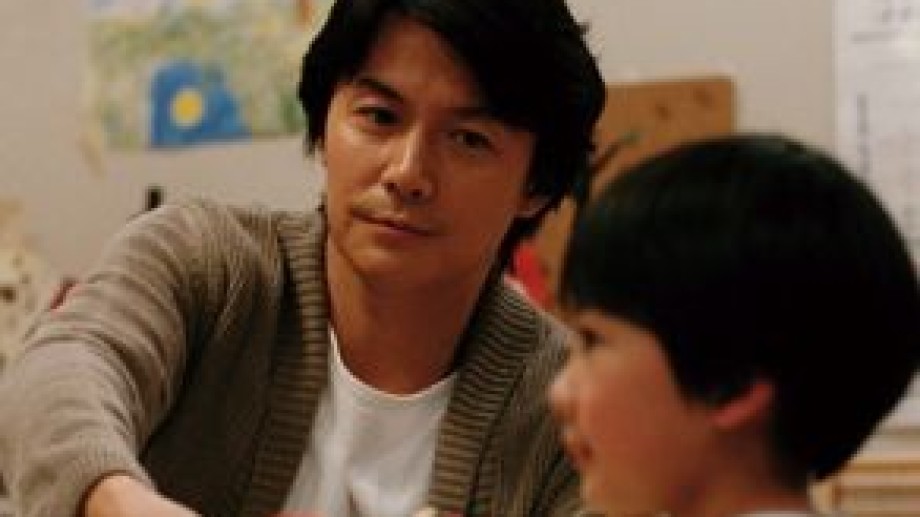
A scene from Hirokazu Kore-eda's Like Father, Like Son.
[In his first dispatch from the 51st New York Film Festival, Critics Academy member Graham Winfrey takes a look at the family dynamic via South Korea's Nobody's Daughter Haewon and Japan's Like Father, Like Son.]
Family dynamics have long provided fertile ground for Asian cinema. Two films from the 51st New York Film Festival’s Main Slate, Nobody’s Daughter Haewon and Like Father, Like Son, explore this familiar territory with strikingly unique perspectives. While both films focus on children living in the aftermath of parental abandonment, the circumstances for each could hardly be more different. Nobody’s Daughter Haewon follows a college student in South Korea whose mother has left the country to start a new life. Like Father, Like Son tells the story of two couples in Japan who discover their six year-old sons were switched at birth by a hospital nurse. In both films, the separation of children from their parents is depicted with heart wrenching realism.
Nobody’s Daughter Haewon begins with a final visit between film student Haewon and her mother Jinju, who is moving to Canada. Their relationship is cordial but only mildly affectionate. Though Jinju praises Haewon lavishly for being “such a good person,” there is no discernible emotional bond between the two. After Jinju leaves, a deeply saddened Haewon asks her former lover and professor Sung-Joon to keep her company for the day. A married man with a newborn baby, Sung-Joon still has feelings for Haewon. While his companionship initially soothes Haewon’s pain, his confession of love reopens old wounds, sending Haewon into a tailspin of inner torment.
In Like Father, Like Son, the realization that Keita and Ryusei were switched at birth leads to an exchange process whereby each child begins spending increasingly long periods of time with their biological parents. These experiences reveal some stark differences between the two families. Keita’s father Ryota is a wealthy businessman who raised his son on the virtues of hard work and discipline. Ryusei comes from working-class parents whose love for their children is on constant display. These divergent philosophies of parenthood lead to markedly different outcomes for the two boys. While Keita develops a strong bond with his biological father, Ryota fails to establish a meaningful connection with Ryusei.

Sang-soo Hong's Nobody’s Daughter Haewon
In both films, the separation of family members propels characters to seek out other relationships. Haewon’s reunion with Sung-Joon, however, leads to further isolation. When Sung-Joon discovers Haewon dated one of her classmates shortly after their affair ended, he assaults her character in an ill-advised tirade. Haewon retreats into a period of solitude, falling behind in her studies and repeatedly turning to binge drinking to escape her fractured relationships.
In Like Father, Like Son, Ryusei has a hard time adapting to the much more confrontational relationship with Ryota than he had with his previous father. Ryota also suffers mightily from the blunt reality of his son’s true identity. He views his new relationship with his biological son as doomed to fail, much like his relationship with his own father, who he resents for never having achieved success financially. “You bet on the wrong man,” Ryota says to his mother. There is also an unspoken rift growing between Ryota and his wife Midori, who is riddled with guilt for not intuitively recognizing the truth about her son.
When relationships in both films seem beyond repair, the characters that’ve hit rock bottom seek redemption in an attempt to pick up the pieces. Sung-Joon reconciles with Haewon at the site of their falling out, an offering that helps bring Haewon closure to her own downward spiral. For the first time, she comes to terms with the reality of her solitude. She still yearns for mother’s love, but no longer tries to replace it with Sung-Joon’s companionship. The reconciliation in Like Father, Like Son takes place when Ryota finally puts his son before his work. He connects with Ryusei by embracing his own inner child, playing along with Ryusei’s games and letting go of the inhibitions of adulthood. Adapting to the new normal is not easy for either of them, but for the first time they begin to resemble father and son.
Family relationships in Nobody’s Daughter Haewon and Like Father, Like Son are tested under drastically different circumstances. Neither film attempts a tidy solution to the complex issues facing the characters that inhabit these stories. Instead, the filmmakers embrace the irreplaceability of parental love.



